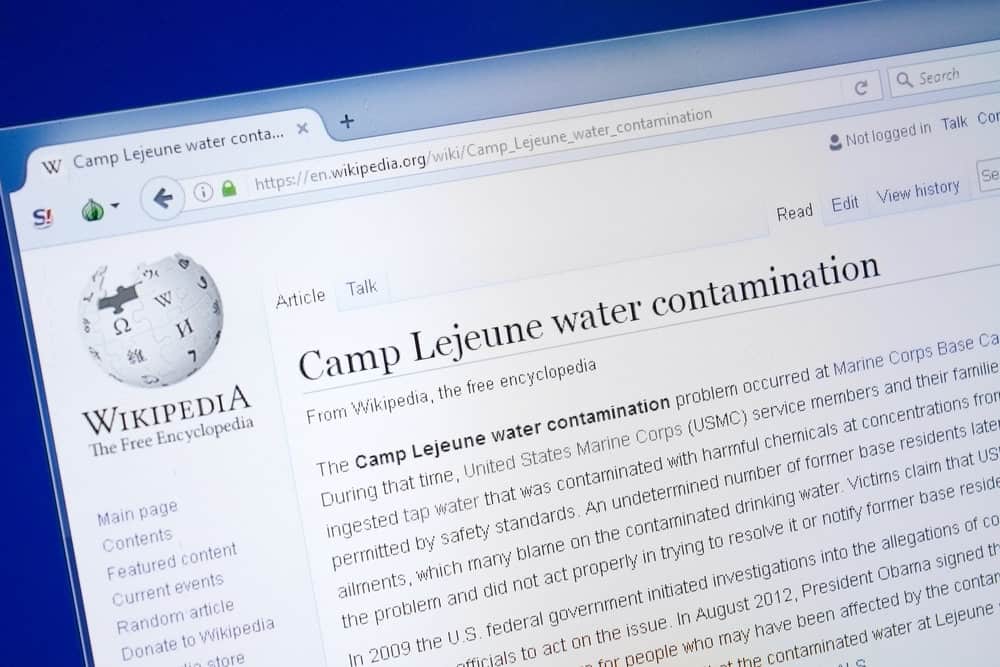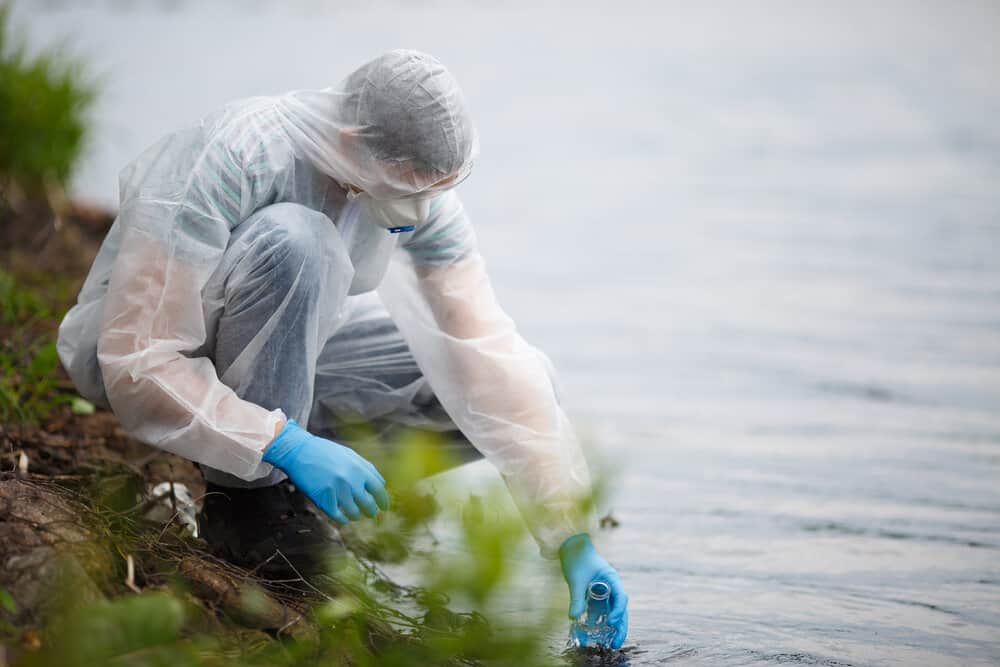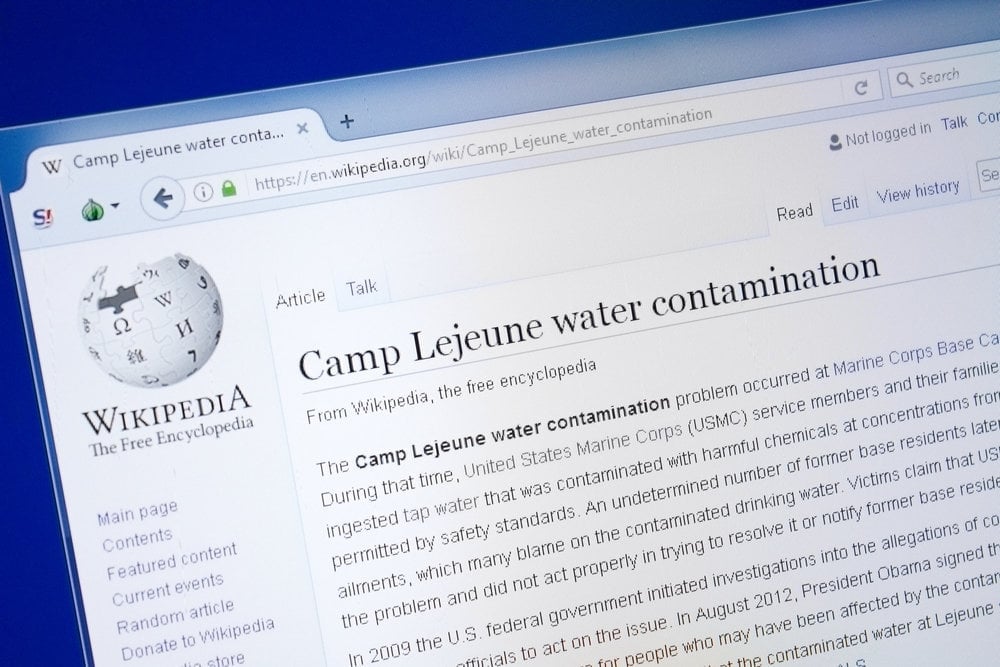If you or a loved one has been affected by the Camp Lejeune water contamination, understanding the potential settlement amounts is crucial to making informed decisions about pursuing legal action. This blog post will explore the various aspects of Camp Lejeune water contamination lawsuits and settlements.
Our in-depth discussion will cover eligibility for a settlement, expected compensation amounts, filing claims, necessary documentation, and timelines for receiving payments. We will also discuss what steps to take if a claim is denied and how to successfully traverse the intricate path of attaining justice for those injured by polluted drinking water at Camp Lejeune.
By providing comprehensive information on Camp Lejeune water contamination settlement amounts and related issues, we aim to empower victims with the knowledge to help them make well-informed choices about their legal options.
What is Camp Lejeune Water Contamination?
The Camp Lejeune water contamination refers to a public health crisis at the U.S. Marine Corps base in North Carolina between 1953 and 1987. During the 1953-1987 period, drinking water at Camp Lejeune was polluted with hazardous chemicals such as TCE, PCE, benzene, and vinyl chloride derived from underground tank leaks, industrial accidents, and waste dumping sites.
The primary sources of these contaminants were leaking underground storage tanks, industrial spills, and waste disposal sites on the base property. As a result of this contamination, thousands of military personnel and their families who lived or worked at Camp Lejeune during those years were exposed to dangerous levels of toxic chemicals linked to various serious health issues.
In response to growing concerns about the long-term effects of exposure to these hazardous substances, Congress passed legislation in 2012 called The Honoring America’s Veterans Act which directed the Department of Veterans Affairs (VA) to provide healthcare benefits for eligible veterans affected by Camp Lejeune water contamination.
A subsequent investigation by federal agencies revealed numerous instances where safety regulations had been violated or ignored during this time frame. This led many victims to suffer from illnesses related directly or indirectly due to their exposure at Camp Lejeune, seeking compensation through class action lawsuits against both private companies responsible for polluting activities as well as government entities tasked with overseeing environmental compliance efforts on-site.
The Camp Lejeune Water Contamination episode is a health hazard due to the polluted drinking water at the North Carolina military base. In the future, it is essential to comprehend who can be approved for payment to receive remuneration for any harm sustained due to this pollution.
Who is Eligible for a Settlement?
Knowing who can get remuneration through a settlement is essential if the Camp Lejeune water contamination impacts you or your family members. The eligibility criteria include:
- Veterans: If you served at Camp Lejeune between August 1, 1953, and December 31, 1987, and were exposed to contaminated drinking water.
- Family Members: Spouses and dependent children of veterans who lived on base during the specified time frame may also be eligible if they developed specific illnesses linked to the contaminated water.
- Civilian Employees: Civilian employees working at Camp Lejeune during the designated timeframe might qualify for compensation if they can prove exposure to contaminated water led directly to their illness.
To be eligible for compensation, victims must have developed a recognized illness due to exposure to the toxic chemicals in the drinking water. These conditions include:
- Kidney cancer
- Liver cancer
- Non-Hodgkin’s lymphoma (NHL)
- Parkinson’s disease ..,.
People at Camp Lejeune between 8/1/53 and 12/31/87 could qualify for a recompense. To learn more about how much you can receive in the settlement amount, we will discuss How Much Can I Receive in a Settlement?
How Much Can I Receive in a Settlement?
If you are eligible for compensation from the Camp Lejeune water contamination lawsuit, you may wonder how much money you can expect to receive as part of your settlement. Given the wide range of individual circumstances, it is difficult to provide an exact settlement amount; however, average settlements in similar cases have ranged between $10,000 and $100,000.
Average Camp Lejeune Settlement Amounts
Roughly, the settlements for people involved in comparable cases span from $10k to $100k per individual. However, this is just a rough estimate and should not be taken as a guarantee for your specific claim. The actual amount awarded will depend on factors such as the severity of your illness or injury related to the contaminated water exposure at Camp Lejeune, medical expenses incurred due to these health issues, lost wages or income potential if unable to work because of your condition, pain and suffering experienced by both yourself and family members affected by the situation.
Factors Affecting Your Settlement Amount
- Evidence: The strength of the evidence linking your illness or injury directly with exposure at Camp Lejeune plays a significant role in determining compensation eligibility and amount.
- Type & Severity: More severe illnesses or injuries from toxic water exposure generally warrant higher settlements than less severe conditions.
- Treatment Costs: If ongoing treatment is required for managing symptoms associated with contaminated water-related health problems (e.g., cancer treatments), these costs could increase the total compensation value.
- Lost Wages: If you could not work or lost income potential due to your health issues, this could factor into the settlement amount.
It is recommended that you seek the advice of a legal specialist in environmental contamination cases to determine appropriate compensation for your claim. They can help assess your situation and guide how much money might be available for your claim. You can also visit the official U.S. Department of Veterans Affairs Camp Lejeune Water Contamination page for more information about eligibility criteria and compensation guidelines.
Consulting an experienced lawyer with expertise in this field is essential to determine the compensation you can receive from a settlement. By filing a claim, victims may obtain financial relief for the damages resulting from Camp Lejeune water contamination.
Key Takeaway:
Suppose you’re eligible for compensation from the Camp Lejeune water contamination lawsuit. In that case, your settlement amount will depend on factors such as evidence linking your illness or injury directly with exposure at Camp Lejeune, type and severity of illnesses or injuries resulting from toxic water exposure, treatment costs required for managing symptoms associated with contaminated water-related health problems, and lost wages. An experienced lawyer with expertise in contamination cases should be consulted to evaluate the individual’s circumstances and offer advice on how much compensation could be obtained.
How Do I File a Claim?

To begin your compensation claim, we are here to guide you through the process and provide the necessary documents, as mentioned in Heading 5. Here’s what you need to do:
- Gather Necessary Documentation: Before filing your claim, ensure you have all the required documents, as mentioned in Heading 5 of this article.
- Determine Your Eligibility: Review the eligibility criteria discussed under Heading 2 and ensure you or your family member qualifies for compensation.
- Contact an Experienced Attorney: Contact a knowledgeable attorney specializing in environmental lawsuits and with experience in cases like Camp Lejeune water contamination. For the best chance of success, enlist a lawyer with expertise in environmental litigation and experience related to Camp Lejeune water contamination.
- File Your Claim Form: With guidance from your attorney, complete and submit the necessary claim forms and supporting documentation to initiate your case against those responsible for the water contamination at Camp Lejeune.
- Stay Informed About Case Progression: Keep yourself updated on any developments related to Camp Lejeune settlements by regularly checking news sources or speaking with your attorney about ongoing litigation progress.
Since every situation is different, the duration of proceedings can differ based on individual circumstances. It’s essential to work closely with an experienced attorney throughout this process who understands how these types of claims work and can provide personalized advice based on their expertise in similar cases.
Submitting a demand is an important activity in getting remuneration for harm, and recognizing what archives are required to do as such will help guarantee your case has the most obvious opportunity for progress. Knowing what documents you need to file your claim can be daunting, but this next section will guide how to prepare these materials.
Is There a Time Limit to Get a Camp Lejeune Water Settlement?
Yes, getting a Camp Lejeune water settlement is a time limit. Camp Lejeune water contamination victims have two years from their last exposure to file a lawsuit in Federal court for damages.
Statute of Limitations
The statute of limitations is an important legal concept that sets forth how long you have to bring your claim or lawsuit against another person or entity. Victims must file suit within two years from their last exposure to contaminated drinking water at Camp Lejeune. After this period has expired, it becomes difficult and often impossible to recover compensation for any injuries caused by the toxic chemicals in the camp’s drinking water supply.
Claim Filing Deadline: August 10, 2024
It is essential to be aware that deadlines are hard-and-fast rules when filing lawsuits for compensation related to contamination at Camp Lejeune. Suppose you wait too long and fail to meet these deadlines. In that case, you cannot recover financially through a successful claim or lawsuit related to your injuries caused by toxic chemicals in the camp’s drinking water supply. As such, if you think you may have been injured due to exposure at Camp Lejeune, you must contact an experienced lawyer as soon as possible so that they can begin working on your case before time runs out and all potential avenues for recovering damages become unavailable.
What Documents Do I Need to File My Claim?
To ensure a smooth and successful claim process for the Camp Lejeune water contamination lawsuit, it’s essential to gather all necessary documents before filing your claim. These documents will help prove your eligibility for compensation and provide evidence of any health issues or damages you’ve experienced due to the contaminated water.
Here is a list of key documents you should gather:
- Proof of Residency: You’ll need documentation showing that you lived on or visited Camp Lejeune during the contamination period (between August 1, 1953, and December 31, 1987). This can include military orders, housing records, utility bills, or other official correspondence with an address at Camp Lejeune.
- Medical Records: Collect all relevant medical records about your health conditions linked to the contaminated water exposure. These may include diagnoses from doctors or specialists, lab results indicating toxic substance levels in your body (such as TCE, PCE), treatment plans, and prescriptions given by healthcare providers.
- Evidence of Disability: If applicable, you must provide proof that shows how exposure has caused disability. This includes Social Security Administration(SSA) determination letters, veterans’ disability rating decisions, or private long-term disability insurance determinations.
In addition to these primary documents, it’s also helpful, if possible, to have additional supporting materials such as :
- Affidavits from friends, family members, and coworkers who can attest to the living situation during time spent at Camp Lejeune and any health issues experienced as a result of exposure.
- Employment records that demonstrate loss of income or inability to work due to illness related to the water contamination
- Receipts for out-of-pocket medical expenses incurred because of your health conditions associated with the contaminated water at Camp Lejeune.
Gathering all necessary documents is vital to constructing a solid case, and an attorney with expertise in environmental law or military-related claims may be able to provide helpful resources for locating complex information. If you’re having trouble locating some documents, consider contacting an experienced attorney specializing in environmental law or military-related claims. An attorney specializing in environmental law or military-related claims may be able to provide assistance and access to resources that could help locate challenging documents.
You must have the necessary documents proving your compensation eligibility to file a claim. Knowing the timeline for obtaining your settlement is essential, so you can arrange it accordingly. Therefore, this next section will discuss when claimants should expect their payments.
Key Takeaway:
To file a successful claim for the Camp Lejeune water contamination lawsuit, it’s crucial to gather all necessary documents, such as proof of residency, medical records, evidence of disability, and supporting materials like affidavits from friends or family members. It is advisable to seek help from an experienced attorney specializing in environmental law or military-related claims if you face difficulty locating some documents.
When Will I Receive My Settlement Payment?
The timeline for receiving a settlement can vary depending on several factors, such as:
- The number of claims filed and their complexity
- The amount of time it takes to process each claim
- Whether or not there are any appeals or additional legal proceedings related to the case
The process could range from a few months to multiple years, but once approved and finalized, payments are typically disbursed promptly. However, once the court system approves and finalizes your claim, payments are typically distributed within a reasonable timeframe.
To stay updated on the progress of the Camp Lejeune water contamination lawsuit and its settlements, consider following news updates from reputable sources like the U.S. Marine Corps official website or consult an experienced attorney.
For those seeking answers to their particular circumstances or help with monitoring the status of their claim, consulting a lawyer knowledgeable in this kind of litigation can be beneficial and offer assistance throughout.
Once accepted for a settlement, the sum and schedule of your remittance will depend on numerous elements. If your claim is denied, options are available to dispute or appeal the decision.
What If My Claim Is Denied?
If your claim for compensation from the Camp Lejeune water contamination lawsuit is denied or rejected by the court system, it’s essential to understand your options and take appropriate action. Here are some steps you can follow if you find yourself in this situation:
- Review the denial letter: Carefully read through the denial letter sent by the court or claims administrator. This document will provide specific reasons for denying your claim and may offer guidance on correcting any errors.
- Gather additional evidence: If your claim was denied due to insufficient evidence, gather more documentation that supports your case. This might include medical records, expert opinions, or other relevant information proving a connection between Camp Lejeune’s contaminated water and your health issues.
- Contact an attorney: It’s highly recommended to consult an experienced lawyer specializing in toxic exposure cases like Camp Lejeune water contamination lawsuits. An attorney can help guide you through the appeals process and ensure all necessary documents are submitted correctly.
- File an appeal: With assistance from a qualified attorney, file an appeal within the specified time frame outlined in your denial letter. Keep track of deadlines, as missing them could permanently result in losing out on potential compensation.
- Stay informed about updates related to Camp Lejeune settlements: Keep yourself updated on any news or developments related to the Camp Lejeune water contamination lawsuit. You can follow reputable sources like justice.gov and va.gov for updates.
In addition to these steps, it’s crucial to maintain open communication with your attorney throughout the appeals process. They can provide guidance and support while working diligently towards a successful outcome in your case.
If you’re unsure whether to pursue an appeal, consider consulting with multiple attorneys specializing in toxic exposure cases. Many offer free consultations that can help determine if appealing is worth pursuing based on your specific circumstances.
Key Takeaway:
If your Camp Lejeune water contamination lawsuit claim is denied, you should review the denial letter, gather additional evidence, and contact an attorney. Filing an appeal within the specified time frame outlined in your denial letter is crucial, as missing deadlines could permanently result in losing out on potential compensation. Stay informed about updates related to Camp Lejeune settlements by following reputable sources like justice.gov and va.gov for updates.
Update on the Pact Act Passed on August 2, 2022.
Overview of the PACT Act
The PACT Act, or the Camp Lejeune Justice Act, was signed into law on August 2nd, 2022. This act enables victims exposed to contaminated water at the Camp Lejeune military base to seek compensation from the government for their injuries and health issues caused by exposure. The act removed a ban in place, preventing victims from filing legal action under the Federal Tort Claims Act.
How It Affects Victims
This new law gives thousands of people exposed to toxic drinking water substances access to justice. It allows them to file lawsuits against those responsible for contaminating their environment with hazardous materials. In addition, it provides financial relief for medical expenses incurred due to illnesses related to this contamination and future healthcare benefits if needed.



